The General Administration Customs China (GACC) recently announced that the import of Taiwanese pineapples will temporarily be halted from the first of March onward. The PRC State Council Office for Taiwan Affairs explained that the prohibition followed the frequent discovery of harmful insect pests in Taiwanese pineapples at Chinese border control posts.
These insect pests form a serious danger for agricultural production areas in China and the stability of the natural environment in general. The decision to prohibition the export of Taiwanese pineapples to the Chines market is a life-threatening decision for the Taiwanese pineapple industry as more than 90% of the Taiwanese pineapples are normally sold in the Chinese market. Many farmers and packaging factories have gone through a lot of trouble to meet the requirements for the Chinese market. This prohibition directly threatens their livelihood. Mr. Rock Yen of Shanghai Rock Trade Co., Ltd. talked about the impact of this prohibition on Taiwan and other pineapple production areas.
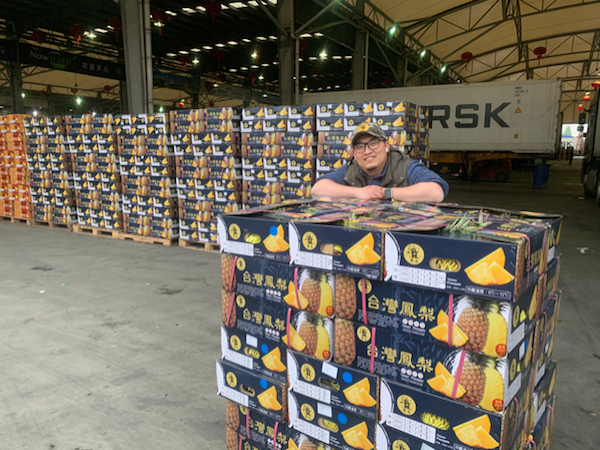
Mr. Rock Yen at the Shanghai Huizhan Market
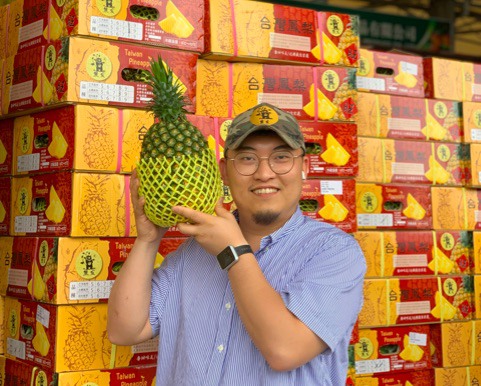
Mr. Rock Yen at the Shanghai Huizhan Market
According to Mr. Rock Yen, "the pineapple supply for the Chinese market has always been more than sufficient, however, Taiwanese pineapples are superior in every sense from flavor and fragrance to the quality of fruit flesh and the sugar content. There are no other production areas that can compete with Taiwan when it comes to pineapples. Taiwanese pineapples have always been high-end market products in China, in part because the transport cost pushes the price up. Taiwanese pineapple traders now have to go and look for alternative markets.
"The Taiwanese government supports exporters who are looking to expand the market in Australia. This is not easy, however, because Taiwanese pineapples are juicy and very ripe, which makes a long sea voyage to Australia a problem. Air freight is the only option, but the cost of air freight adds to the retail price of Taiwanese pineapples in Australia. This makes Taiwanese pineapples more expensive than Australian pineapples, and therefore makes competition more difficult. I predict that if the Chinese market remains closed to Taiwanese pineapples that the Taiwanese market would absorb most of the pineapples and process them as dried pineapple, pineapple slices in a tin can, and pineapple juice."
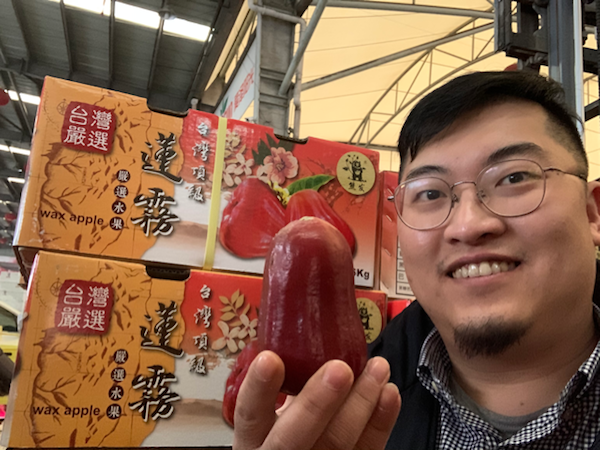
Mr. Rock Yen visits Shanghai Huizhan Market
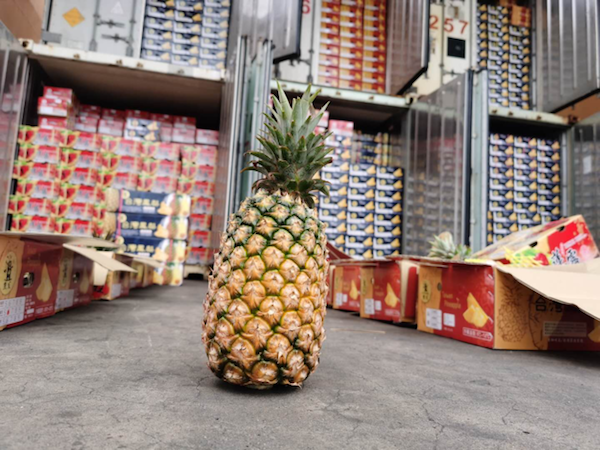
Taiwanese pineapple
In all fairness, more than 99.7% of the Taiwanese pineapples exported to China in 2020 met the required standards. According to Mr. Rock Yen this decision to temporarily prohibit Taiwanese pineapple import was caused by an unexpected incident that could have been avoided. Some fumigation procedures can easily help the pineapples reach the required standards for the Chinese market.
The main issue is the maintenance of cooperative partnerships between China and Taiwan. If both sides are willing to adopt and implement new measures, then this situation can still be resolved. The Taiwanese pineapple season has only just begun and if the Chinese market opens up again before the peak sales period begins, then the damage will remain limited.
According to Mr. Rock Yen, "the decision to temporarily halt the import of Taiwanese pineapples has an impact on Taiwan, but also on other pineapple-producing countries. Traders who suddenly saw their supply cut off will be more careful in the future. Furthermore, this prohibition gives Taiwan a bad name in the Chinese market. That is not profitable to either side. I think that everybody should remain calm and reasonable in the face of this temporary prohibition on Taiwanese pineapple export to China."

When asked about the impact this temporary prohibition will have in other pineapple producing countries, Mr. Rock Yen replied, "the impact will be most visible in the domestic pineapple industry, especially in Hainan and Xunwen in Guangdong. Pineapple prices in these areas have already gone up by more than 30% since the temporary prohibition was announced. The pineapple season has just begun in Xuwen, Guangdong. The supply volume is still very limited.
"At the same time, the harvest season in Hainan has already been adjusted to April. The sales conditions of Hainan pineapples are quite representative for the market. There is currently a shortage of Hainan pineapples. Pineapples from Hainan are not as good as Taiwanese pineapples, but they form a reasonable alternative in terms of product quality, but there is a temporary shortage of Hainan pineapples. Considering the absence of Taiwanese pineapples in the Chinese market, and the small supply volume of Hainan pineapples, the price of Hainan pineapples naturally went up."
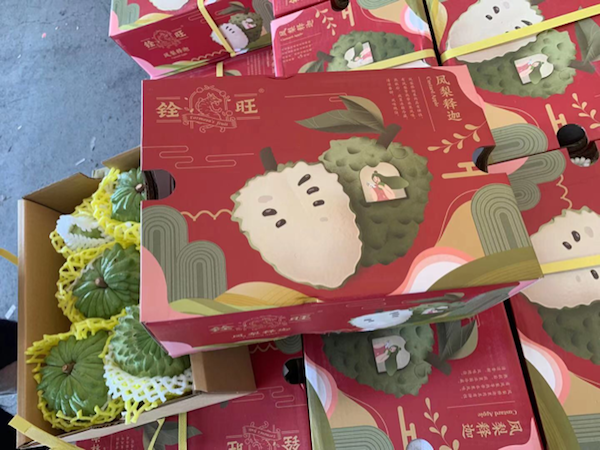
Sakyamuni fruit Taiwan
Hainan pineapples take advantage of the temporary prohibition on Taiwanese pineapple export to the Chinese market. The Philippines also supplied pineapples to the Chinese market, and their supply volume nearly doubled around Chinese Spring Festival [12 February, 2021].
However the Philippines could not fill the hole left behind by the Taiwanese market. One of the reasons is that the Philippines is still struggling with the consequences of lockdown. Personnel are unable to reach their workplaces. In addition, ports can not get their hands on enough containers. That is why the hole left behind by Taiwan is difficult to fill.
According to Mr. Rock Yen, "Thailand and Malaysia will likely do very well on the Chinese pineapple market this year. These two countries have tropical weather in their pineapple production areas and they can produce top-quality pineapples throughout the year. Furthermore, these two countries are close to China, which will reduce the transport cost. That is why Thailand and Malaysia received permission to export pineapples to the Chinese market early on. In actuality, the prices of pineapples from Thailand and Malaysia have already begun to rise, although not as fast as the pineapples from Guangdong and Hainan."

Taiwanese Sakyamuni
Shanghai Rock Trade reported that Taiwanese imported fruit accounts for 40% of all fruit import in east China and more than 60% of all fruit import in Shanghai Huizhan Market. The Taiwanese fruit imported by Rock Trade is sold under the labels 'xiongfa' and 'quanwiang'. The company mainly sells through wholesale markets, but hopes to expand into retail and online trade too. Online traders cooperate with production areas in Hainan to better satisfy the diverse needs of Chinese consumers.
For more information:
Mr. Rock Yen
Queen Want Trading Co. Ltd.
Tel.: +86 156 0192 5775
E-mail: rockgogogo@qq.com
